 W
WThe Black Panther Party (BPP), originally the Black Panther Party for Self-Defense, was a Black Power political organization founded by college students Bobby Seale (Chairman) and Huey P. Newton in October 1966 in Oakland, California. The party was active in the United States from 1966 until 1982, with chapters in numerous major cities, and international chapters in the United Kingdom in the early 1970s, and in Algeria from 1969 to 1972. At its inception on October 15, 1966, the Black Panther Party's core practice was its open carry armed citizens' patrols ("copwatching") to monitor the behavior of officers of the Oakland Police Department and challenge police brutality in the city.
 W
WAll Power to the People: The Black Panther Party and Beyond is a 1996 documentary directed by Lee Lew-Lee. The film chronicles the history of the Black Panther Party, leadership, and members. The film also briefly chronicles the history of the American Indian Movement and Black Liberation Army. The film covers assassinations and methods used to divide, destroy, and imprison key figures within the party. It is composed primarily of archival footage and interviews of former organization members and government agents. The documentary was broadcast in 24 countries on 12 networks in the United States, Canada, Europe, Asia and Australia between 1997 and 2000.
 W
WAmerican Revolution 2 is a 1969 documentary on the 1968 Democratic National Convention and its aftermath. Part of the film focuses on the creation of an alliance between the Young Patriots Organization and local Black Panthers. On its release Roger Ebert gave the film four stars, while New York Times reviewer Roger Greenspun was more critical. The film was released on DVD in 2007 and received generally positive reviews.
 W
WThe Angola Three are three African-American former prison inmates who were held for decades in solitary confinement while imprisoned at Louisiana State Penitentiary. The latter two were indicted in April 1972 for the killing of a prison corrections officer; they were convicted in January 1974. Wallace and Woodfox served more than 40 years each in solitary, the "longest period of solitary confinement in American prison history."
 W
WBlack against Empire: The History and Politics of the Black Panther Party is a 2013 book focusing on the history of the Black Panthers. It is written by Joshua Bloom and Waldo Martin.
 W
WBlack Panthers is a 1968 short documentary film directed by Agnès Varda. The film focuses on the Black Panther Party in Oakland, California, during protests over the arrest of Black Panther co-founder Huey P. Newton for the murder of police officer John Frey in 1967.
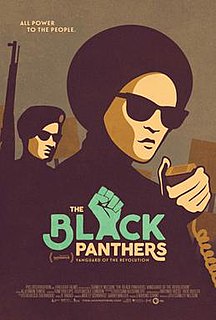 W
WThe Black Panthers: Vanguard of the Revolution is a 2015 American documentary film directed and written by Stanley Nelson Jr. The film combines archival footage and interviews with surviving Panthers and FBI agents to tell the story of the revolutionary black organization the Black Panther Party. It is Nelson Jr.'s eighth film to premiere at Sundance. The film was pitched at Sheffield Doc/Fest's MeetMarket in 2014 and is the first of a three-part series of documentary films about African-American history America Revisited. It will be followed by Tell Them We Are Rising: The Story of Historically Black Colleges and Universities and The Slave Trade: Creating a New World.
 W
WEldridge Cleaver, Black Panther is an Algerian documentary film made in 1969 and directed by William Klein. The film covers Black Panther activist Eldridge Cleaver while exiled in Algeria. Cleaver moved to Algeria after the U.S. state of California tried to charge him with intent to murder. In the documentary, Cleaver discusses revolution in the United States and denounces political figures Richard Nixon, Spiro Agnew, Ronald Reagan and Richard J. Daley.
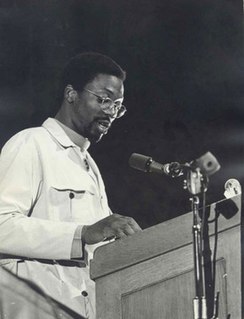 W
WRaymond "Masai" Hewitt was an American civil rights activist who was one of the leading members of the Black Panther Party.
 W
WA Huey P. Newton Story is a 2001 American film adaptation directed by Spike Lee. The movie was created, written and performed, as a solo performance, by Roger Guenveur Smith at The Joseph Papp Public Theater. In this performance, Smith creates a representation of the activist Huey P. Newton's life and time as a person, a citizen and an activist. During the performance, images are shown up-stage from activist movement era. The simple arrangement of Smith sitting in a chair stage-center makes the audience focus on the dialogue of the performer. Smith captures the attention of the audience throughout the film by putting into play his solo performance skills. Smith's idea for the performance originated in 1989 and took root as a stage play in 1996. Smith's performance attempt to show a shy individual that Huey P. Newton believed himself to be. He did not consider himself a charismatic person, although he had made many contributions to his community. Smith shows Newton as a conservative individual who is disgusted by having microphones and cameras close to him.
 W
WJudas and the Black Messiah is an upcoming American biographical drama film about Fred Hampton and the Black Panther Party in the 1960s. Directed and produced by Shaka King, the film was written by King and Will Berson, based on a story by King, Berson, and Kenny and Keith Lucas. The film stars Daniel Kaluuya and Lakeith Stanfield.
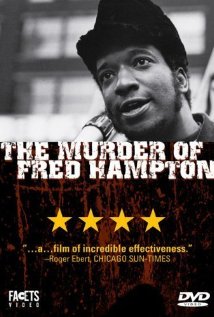 W
WThe Murder of Fred Hampton is a 1971 documentary film about the short life and death of Fred Hampton, a young African-American civil rights activist in Chicago and leader of the Illinois Black Panther Party. During the film's production, Hampton was fatally shot on December 4, 1969 in a pre-dawn raid at his apartment by the Chicago Police Department.
 W
WThe New Afrikan Black Panther Party (NABPP) is a Maoist organization in the United States, largely based in prison and referred to as the New Afrikan Black Panther Party – Prison Chapter (NABPP-PC). The party is built as a modern-day continuation of the Black Panther Party prison chapter developed by George Jackson and W. L. Nolen.
 W
WIn 1970 there was a series of criminal prosecutions in New Haven, Connecticut against various members of the Black Panther Party. The charges ranged from criminal conspiracy to felony murder. All indictments stemmed from the murder of 19-year-old Alex Rackley in the early hours of May 21, 1969. The trials became a rallying-point for the American Left, and marked a decline in public support, even among the black community, for the Black Panther Party.
 W
WNight Catches Us is a 2010 drama film directed and written by Tanya Hamilton and stars Kerry Washington, Anthony Mackie, Jamie Hector, Wendell Pierce and Novella Nelson.
 W
WWilliam O'Neal was an American FBI Informant on Black Panther Party known for being the FBI informant who gave the floor plan to police in order to raid and kill Black Panther leader Fred Hampton in 1969.
 W
WPanther is a 1995 cinematic adaptation of Melvin Van Peebles's novel Panther, produced and directed by Mario Van Peebles. The drama film portrays the Black Panther Party for Self-Defense, tracing the organization from its founding through its decline in a compressed timeframe. It was the first narrative feature-film to depict the Black Panther Party.
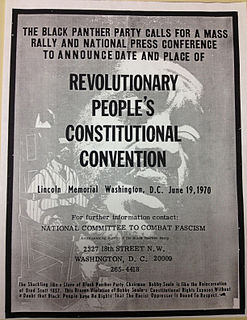 W
WThe Revolutionary People's Constitutional Convention (RPCC) was a conference organized by the Black Panther Party (BPP) that was held in Philadelphia from September 4–7, 1970. The goal of the Convention was to draft a new version of the United States Constitution and to unify factions of the radical left in the United States. The RPCC represented one of the largest gatherings of radical activists across movements and issues in the United States. The Convention was attended by a variety of organizations from the Black Power Movement, Asian American Movement, Chicano Movement, American Indian Movement, Anti-war movement, Women's Liberation, and Gay Liberation movements. Estimates of attendance range from 6,000 to 15,000. Attendees convened in workshops to draft declarations of demands related to various issues, which were ultimately intended to be incorporated into a new constitution which would function as the final vision of those movements. The RPCC also signified a shift in BPP focus from black self-defense to a broader revolutionary agenda. While conflicts did arise during the Philadelphia Convention, the conference was ultimately deemed a success by the Panthers. After the Philadelphia conference, attempts were made to reconvene to finalize and ratify the new constitution in Washington, DC a few months later but ultimately failed due to police interference and Panther disorganization.
 W
WRevolutionary Suicide is an autobiography written by Huey P. Newton with assistance from J. Herman Blake originally published in 1973. Newton was a major figure in the American black liberation movement and in the wider 1960’s counterculture. He was a co-founder and leader of what was then known as the Black Panther Party (BPP) for Self-Defence with Bobby Seale. The Chief ideologue and strategist of the BPP, Newton taught himself how to read during his last year of high school, which led to his enrollment in Merrit College in Oakland in 1966; the same year he formed the BPP. The Party urged members to challenge the status quo with armed patrols of the impoverished streets of Oakland, and to form coalitions with other oppressed groups. The party spread across America and internationally as well, forming coalitions with the Vietnamese, Chinese, and Cubans. This autobiography is an important work that combines political manifesto and political philosophy along with the life story of a young African American revolutionary. The book was not universally well received but has had a lasting influence on the black civil rights movement and resonates today in the Black Lives Matter movement.
 W
WJean Dorothy Seberg was an American actress who lived half her life in France. Her performance in Jean-Luc Godard's 1960 film Breathless immortalized her as an icon of French New Wave cinema.
 W
WAlprentice "Bunchy" Carter was an American activist. Carter is credited as a founding member of the Southern California chapter of the Black Panther Party. Carter was shot and killed by a rival group, and is celebrated by his supporters as a martyr in the Black Power movement in the United States. Carter is portrayed by Gaius Charles in the 2015 TV series Aquarius.
 W
WThe United Front Against Fascism (UFAF) was an anti-fascist conference organized by the Black Panther Party and held in Oakland, California, from July 18 to 21, 1969.
 W
WThe White Panthers were an anti-racist political collective founded in 1968 by Pun Plamondon, Leni Sinclair, and John Sinclair. It was started in response to an interview where Huey P. Newton, co-founder of the Black Panther Party, was asked what white people could do to support the Black Panthers. Newton replied that they could form a White Panther Party. The counterculture era group took the name and dedicated its energies to "cultural revolution." John Sinclair made every effort to ensure that the White Panthers were not mistaken for a white supremacist group, responding to such claims with "quite the contrary." The party worked with many ethnic minority rights groups in the Rainbow Coalition.
 W
WThe Black Panther Party (BPP), originally the Black Panther Party for Self-Defense, was a Black Power political organization founded by college students Bobby Seale (Chairman) and Huey P. Newton in October 1966 in Oakland, California. The party was active in the United States from 1966 until 1982, with chapters in numerous major cities, and international chapters in the United Kingdom in the early 1970s, and in Algeria from 1969 to 1972. At its inception on October 15, 1966, the Black Panther Party's core practice was its open carry armed citizens' patrols ("copwatching") to monitor the behavior of officers of the Oakland Police Department and challenge police brutality in the city.
 W
W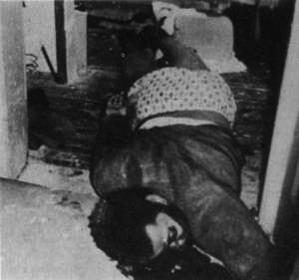 W
W W
W